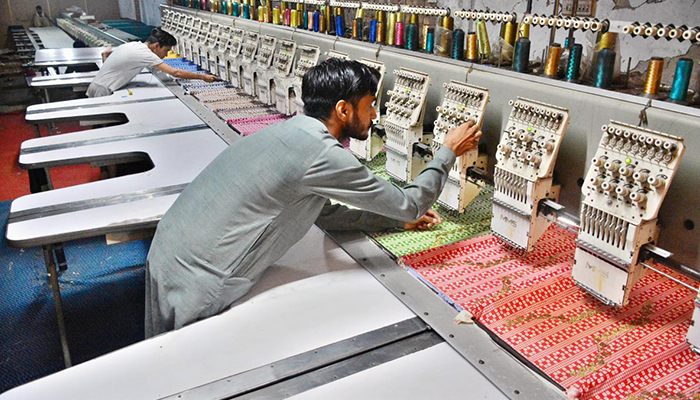
- The study calls for reinstating exemptions from export facilitation programs.
- Late refunds harm exporters and undermine the credibility of the GST system.
- Textile sector closures and job losses are compounding economic challenges.
ISLAMABAD: Rising costs of local inputs can lead to economic losses equivalent to 2% of GDP (over Rs 1.7 trillion), a new study has revealed.
The independent study led by eminent economist Dr Nadeemul Haque was carried out by Socionomic Insights and Analytics (SIA), News reported Tuesday.
To address these concerns, the study strongly recommends restoring the EFS (Export Facilitation Program) to its pre-Finance Act 2024 form, by reinstating the zero-rated sales tax exemption on supplies locally intended for manufacturing for export.
This approach, considered the best solution, would not require any adjustments, allowing business activities to resume as before.
The study and its findings were also sent to FBR Chairman Rashid Mehmood Langrial by the All Pakistan Textile Mills Association (APTMA) on Monday.
Alternatively, the study suggests creating a level playing field by imposing equal GST on imported inputs used in manufacturing for export. However, this approach would require a complete overhaul of the refund system to ensure timely and full sales tax refunds to exporters, thereby minimizing costs associated with delays and partial refunds.
“Unilaterally imposing GST on domestic inputs will lead to adjustments in the local value chain which, depending on the outcome, could be costly in the short term. The value chain adjusts at its own pace.
Estimates suggest that forced changes by making local inputs more expensive will impose excessive costs of up to 2% of GDP (over 1.7 trillion rupees). »
Recent gains from exports could then be threatened. The losses suffered, both economic and socio-economic, are staggering. The erosion of trust between industry players and tax authorities further complicates efforts to implement reforms.
Addressing these challenges requires a holistic approach that balances the needs of exporters, supports local industries and ensures compliance through strong monitoring and reconciliation mechanisms. »
According to the study, high value-added producers will not be affected by the extension of GST on domestic products since imports are exempt from tax. Upstream producers will of course have to compete with GST-exempt imports, which are also not subject to any customs duties.
Economically, upstream sectors are experiencing an erosion of their terms of trade due to this change. Those who use imported inputs will abandon these domestic inputs. “Our consultations show that the costs of adjustment could be significant and, at least in the short term, also put pressure on exports.”
The study also reveals that misuse of the EFS scheme is not widespread and could be effectively controlled through targeted adjustments.
Specifically, this includes rigorously enforcing the eligibility requirements for participation in the EFS, ensuring strict sanctions in cases of malfeasance and reducing the audit/reconciliation period from five years to six months, supported by robust online monitoring of transactions and algorithmic controls of inputs and exports. .
The study highlights the urgent need for policy intervention to restore a level playing field for local inputs in export manufacturing compared to imported inputs.
Such action is essential to safeguard Pakistan’s textile sector and its vital contributions to the national economy. The study highlights that the current policy not only threatens the viability of the formal textile sector, but also encourages the informal sector, which operates outside the tax net.
As a result, Pakistan’s textile sector has experienced significant closures, widespread job losses and a decline in competitiveness, with knock-on effects throughout the economy, including agriculture and services.
Producers continue to complain about delays in refunds as well as incomplete refunds. For its own credibility and effective expansion of the GST system, urgent steps must be taken to ensure speedy reimbursement of the GST system.
Several national examples are available and the FBR has many consultants working on the problem. “We are sure that there is a recognition of the need for a good refund system. With this system in place, the hesitancy of producers to move to full GST will be reduced. Indeed, this could be a step important to expand the GST base.
“As this is not a study on GST, Socionomic Insights and Analytics will not go into detail on how to fix the refund system, but there is a huge consensus that digitalization is the solution.”
“Here he would only like to highlight the possibility of perhaps using algorithms to reconcile inputs and outputs and following the practice of many markets which allows instant refunds on certain transactions to qualified persons, provided they reconcile periodically the difference.
This could provide much-needed liquidity while ensuring tax collection. Algorithms can allow this to happen, and malpractices are identified relatively quickly. »
The data also shows that exports as a percentage of GDP are on a slight downward trend, which is very worrying. Simulation exercises also show that political instability, particularly changes in tariffs and taxes, tends to have a negative impact on exports.
The Haque Tax Commission report also showed that stability of tax policy is very important for investment and growth. Policy volatility has been a significant obstacle that policymakers must keep in mind before changing past policies, especially on tax matters.
